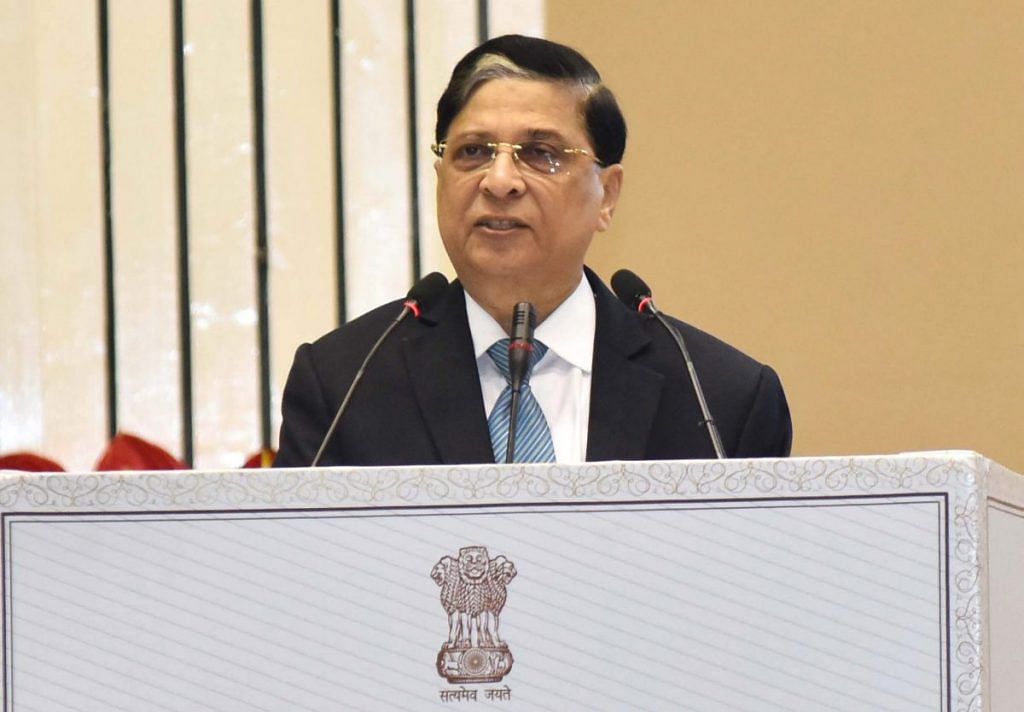Congress leaders claim that the timing of the motion has nothing to do with Thursday’s ruling in the CBI judge Loya death probe case.
New Delhi: Opposition parties led by the Congress Friday moved a motion of impeachment against Chief Justice of India Dipak Misra, the first time in history that such a move has been initiated against the top judge of the apex court.
Opposition leaders said the motion had been moved because “his conduct is unbecoming of a person holding the office” of Chief Justice of India.
Senior Congress leader Ghulam Nabi Azad told a press conference that the impeachment motion had been moved on “five grounds of misbehaviour.” Azad was speaking on behalf of a group of seven opposition parties who met the Chairperson of Rajya Sabha, Venkaiah Naidu, to submit the motion.
“We sought a meeting a week ago,” Azad repeatedly stressed to clarify that the move was not prompted by the Supreme Court’s ruling in the judge Loya case Thursday.
The meeting with Naidu reportedly lasted for about 40 minutes but the merits of the impeachment motion were not discussed, it is learnt.
Azad said that 71 parliamentarians had signed the impeachment motion but at least seven have since retired since the conversation on impeachment began in November last year.
“We wish this day had never come. An independent judiciary is imperative for a democracy,” senior advocate and Congress leader Kapil Sibal said as he read out the impeachment motion.
Sibal added that although three months have passed since, critical questions raised by four senior judges of the court have not been resolved, referring to the 12 January press conference held by Justice Jasti Chelameswar and three other judges.
Although the CJI is one among equals on the judicial side, he has vast powers on the administrative side. Sibal stressed that “since Dipak Misra has been appointed CJI, several questions have been raised on how he has conducted his affairs.”
“We hope that a thorough enquiry will be held so that truth alone triumphs,” he said.
The impeachment motion lists the following five allegations against Misra:
- The facts and circumstances relating to the Prasad Educational Trust case show prima facie evidence suggesting that Chief Justice Dipak Misra may have been involved in the conspiracy of paying illegal gratification, which at least warrants a thorough investigation.
- That Chief Justice Dipak Misra dealt, on the administrative as well as judicial side, with a writ petition which sought investigation into a matter in which he too was likely to fall within the scope of investigation since he had presided over every bench which had dealt with the case and passed orders in the case of Prasad Educational Trust, and thus violated the first principle of the Code of Conduct for judges.
- That Chief Justice Dipak Misra appears to have antedated an administrative order dated 6 November 2017, which amounts to a serious act of forgery/fabrication.
- That Chief Justice Dipak Misra acquired land when he was an advocate, by giving an affidavit that was found to be false and, despite the orders of the ADM cancelling the allotment in 1985, surrendered the said land only in 2012 after he was elevated to the Supreme Court.
- That Chief Justice Dipak Misra has abused his administrative authority as master of roster to arbitrarily assign individual cases of particular advocates in politically sensitive cases to select judges in order to achieve a predetermined outcome.
